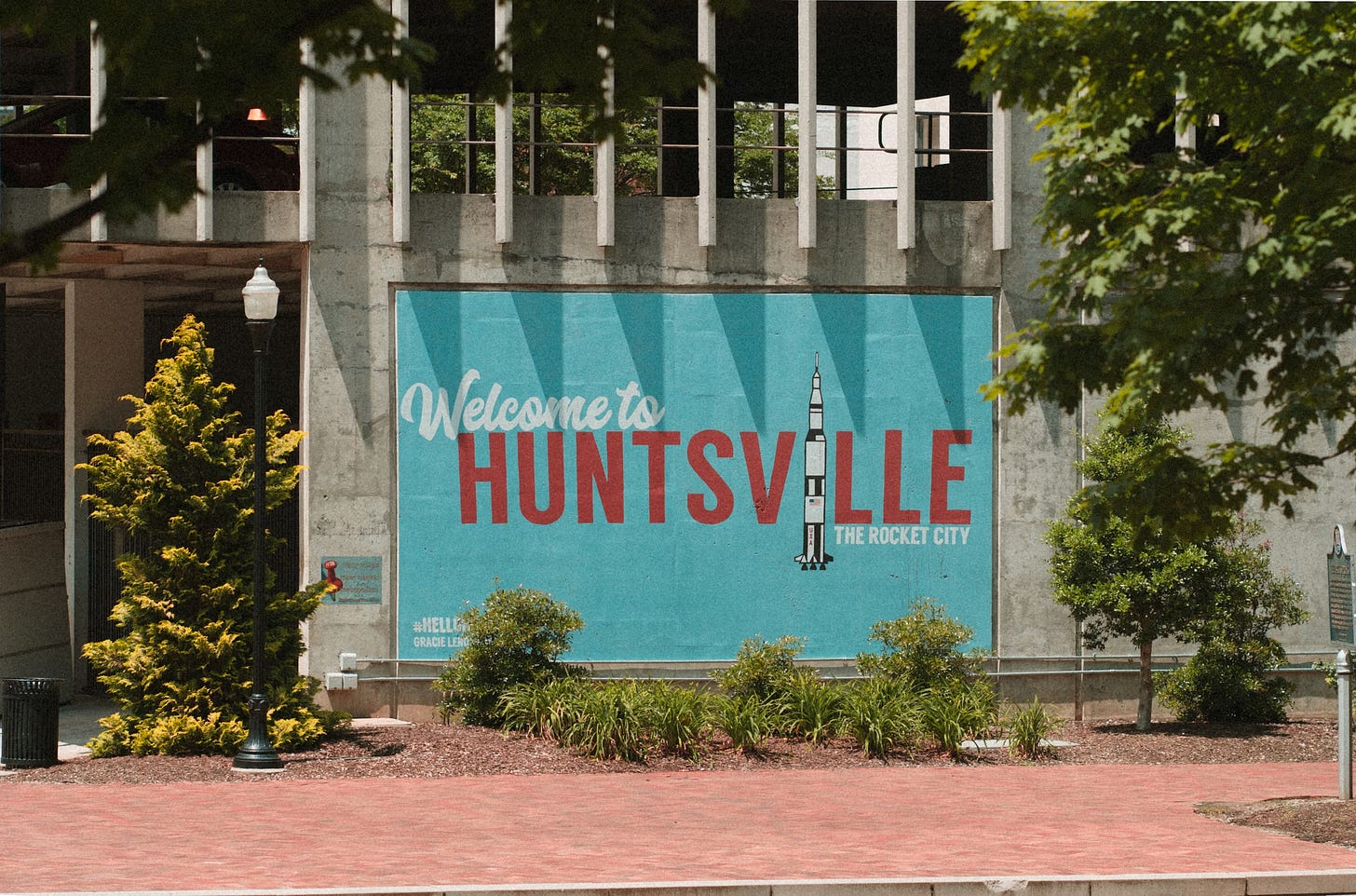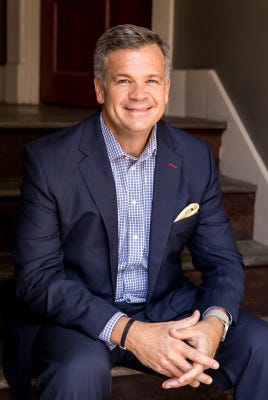Vision + Stubbornness = Magic
Every city needs an organization like the Huntsville Committee of 100.
You don’t have to be the Queen of Woke to react with suspicion at the thought of hundreds of business people wielding a great deal of influence over public affairs. We all remember Elon Musk’s time at DOGE and we can certainly be forgiven for harbouring a healthy dose of paranoia.
But that wouldn’t be fair to a long and honourable tradition of business folks investing in or giving back to their community. Intentions do matter, of course. But when people with means and ability come together to work for the common good, we should let ‘em.
A healthy and prosperous society is good for business, and smart business leaders know that. For all I know it’s their primary reason for investing in their community. But if the result of their involvement is a healthy and prosperous society where the majority of people are better off than they would be absent said involvement, and there are robust public programs in place for those who struggle to keep up and need a little help… where, exactly, is the problem?
Very few organizations of business leaders have had positive influence over a community like the Huntsville Committee of 100 has had on the Rocket City in its first 30 years of existence. I sat down recently with John Allen, CEO of the C100, to ask him what he does, why and for whom.
My acquaintance with the C100 started on one of my very first visits to Huntsville in early 2022 when one of the group’s prominent members, someone who would become a dear friend, told me about C100’s initiative to raise $1 million to pay for local public school teachers to get board certified should they wish to. You have to understand that in Alabama, the quality of education is not… evenly distributed. Let’s just say the stats don’t show the Yellowhammer State at the head of national rankings on the three Rs or indeed much of anything else except maybe for football chants and a strong tailgating tradition.
Board certification is not mandatory for someone to become a teacher. It also costs about $2,000. As a result, few teachers have it. Four or five years ago the C100 saw this as an opportunity to get involved and do something concrete to raise the standards of public education in their city, without stepping on anyone’s toes. They just recently achieved their goal of raising $1 million from the business community.
“We’ve got 55,000 kids today in schoolrooms across Huntsville, Madison County, that are our next leaders, workforce, elected leaders,” Allen says. They are worth investing in.
When telling the origin story of C100, Allen is clear that the group’s intent was always to work in areas that weren’t already being addressed by others. He follows the founders’ instructions: “we need to work in the margins. We need to work in the gaps.” He spends a great deal of his time looking for margins and gaps to work in.
“We don’t work on tomorrow’s problems,” Allen says. “We’re looking at five to ten years out. And the majority of our work takes five to ten years to get things moving and accommodated and people in the right place so that you start working on bigger issues that can affect bigger areas of our community.”
The group is relentlessly (almost annoyingly) non-partisan. It has a political action committee called BizPac whose mission is “to identify, develop and encourage visionary, business-oriented candidates with a commitment to cooperative government to run for local public office, and support them as they serve the community.”
C100 members are encouraged to run for office and many have. But they must resign their membership while in office. “Because you know what? We might get sideways with them,” Allen explains.
My second encounter with the group was later in the spring of 2022, when I attended a “Rock the Vote” public event where candidates for office had tables, buttons and literature for anyone who wanted to know about them. I wrote about it here. This being Alabama the political diversity didn’t stretch overly far to the left, but there were significant differences between the various hopefuls and every single candidate present was keen to engage anyone and everyone, including a non-citizen. They didn’t care that I couldn’t vote. They were happy to tell me who they were and answer any questions I had.
When the C100 began endorsing candidates in the 1990s, they didn’t have much success. The last municipal elections to take place a few weeks ago were in the neighbouring city of Madison, where six out of seven councilpersons and the mayor were C100-endorsed candidates.
Allen, a Huntsville native who’s held an impressive number of jobs from mechanical engineer to real estate entrepreneur, has been with the organization since 2002, and in the top job since 2017. He’s grateful for the long-term regional perspective his earlier career gave him, and he uses it to inform how the Committee’s Launch initiative fosters regional partnerships across Hunstville’s large geographical area.
Yes, that’s something a large and diverse city like Ottawa could take inspiration from. Don’t think I didn’t notice.
Pay your civic rent
John Allen — and, I’m going to guess, the members of C100 — believe in the concept of paying their civic rent. Belonging to this group is a great way to help make the community a better place.
The Huntsville Committee of 100 has over 350 members now (yes, they find it funny), and they each pay equal amounts in dues, no matter how well off they are or how big their business is. The group gets zero funding from outside sources, and membership is by invitation. It feels and sounds like a country club, except it’s entirely devoted to making the community healthier and more prosperous. The group is so successful it might turn a socialist into a modern-day Carnegie.
The truth is that business leaders need a good and healthy society with strong public programs in order to thrive. And you can’t have strong, and well-funded public programs without a healthy business community creating jobs, opportunities and — critically — tax revenues. It’s not business vs community. It’s both growing together in a symbiotic relationship.
The key is to find people who are “servant leaders,” Allen explains. People who are willing to serve — not to line their pockets but to, well, serve their community. And to be incredibly persistent in that mission to find quality leaders and encourage them to run for local positions.
“We are a long-term strategic organization. We work very diligently to see what’s coming around the bend in the next five to ten years and find a way strategically to get people in the right places, either in appointed positions, elected positions, and have the resources and fundamentals in place,” Allen says.
I’m starting to develop a theory that in some places, community-minded business leaders do at least as much if not more to improve the day-to-day lives of people in their communities than many professional politicians I could name. Nobody should wield unchecked influence. But we shouldn’t let paranoia get in the way of progress either.




Well you and me on the math, general math - accounting. I get a nose bleed, literally. Both sides. My body rebels!
Just curious. I did a cursory flip thru. Seems there are some woman.
Always checking.
xxx
em
Just curious as I snuggle down in my Tuscan airbnb bed after a long 12 hour foundry day… what % are women?
em